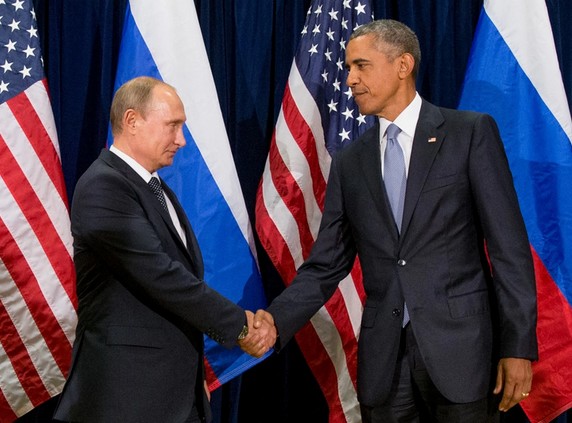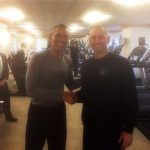NEW YORK — U.S. President Barack Obama and Russian President Vladimir Putin’s first formal meeting in more than two years started with an awkward handshake and ended without a breakthrough on Syria, a crisis that has strained their already tense relationship.

On the biggest issue that divides them in Syria — the status of embattled leader Bashar Assad — Obama and Putin left their discussions Monday exactly where they started. The U.S. still insists Syria’s future cannot include Assad, while Putin appears to only want to bolster the standing of his longtime ally, casting him as the best defense against Islamic States militants.
Even so, both leaders appeared interested in whether their meeting on the sidelines of the United Nations General Assembly could yield progress toward ending Syria’s 4½ year civil war. After the 90-minute sit-down at U.N. headquarters, Putin and U.S. officials who described the meeting on Obama’s behalf each spoke of the need for cooperation.
Strange is it may seem, there were many common points, Putin told reporters. There were also disagreements which we agreed to work together. I hope this work will be constructive.
U.S. officials said the leaders agreed to explore ways to pursue a resolution to a crisis that has left more than 250,000 dead, even as they made clear Obama wasn’t bending on his insistence that Assad not be part of the eventual solution.
Monday’s meeting marked another chapter in Obama’s and Putin’s history of colorful and tense encounters. They laid the groundwork for the meeting in dueling speeches at the U.N., and then were forced to sit together at lunch, exchanging steely glances as they clinked champagne glasses during a toast. They appeared briefly before reporters before beginning their talks, quickly shaking hands, but making no remarks.
That the leaders met at all underscored Obama’s acceptance of Russia’s increasingly prominent role in resolving the crisis in Syria. The U.S. president has resisted granting Putin the legitimacy of a formal bilateral meeting following the Russian president’s provocations in Ukraine. But White House officials calculated that it was worth bending on that front for the opportunity to assess Putin’s Syria motivations in person.
The meeting also highlighted Putin’s ability to command attention and shift it away from the Ukraine. A fragile peace plan in the former Soviet republic remains shaky at best, yet the crisis was largely a footnote at the U.N. gathering.
Instead, attention was riveted on what Putin would say about Syria and Assad as he arrived in New York for his first U.N. meeting in a decade. In the weeks leading up to his arrival, Putin ratcheted up his country’s military presence in Syria and struck an intelligence-sharing agreement with Iran, Syria and Iraq, another nation fighting the Islamic State.
Both developments caught U.S. officials off guard.
Putin also moved swiftly to try to capitalize on the failure of U.S. efforts to train and equip moderate Syrian rebels — a $500 million Pentagon program that was supposed to yield more than 5,000 fighters but instead only has only a handful of active graduates. The Russian leader jabbed Obama over the program’s failures in his remarks to the U.N. General Assembly on Monday.
The global landscape looks far different than what some in the Obama administration envisioned earlier this year.
Fresh off the success of Iranian nuclear negotiations that resulted in a rare alignment among Russia, China and the West, some U.S. officials wondered whether that partnership could serve as a model for tackling other crises, including Syria. Officials also suggested there was reason to be optimistic that Putin was growing impatient with Assad.
Obama even suggested that possibility in a July interview with New York Times columnist Thomas Friedman.
I was encouraged by the fact that Mr. Putin called me a couple of weeks ago and initiated the call to talk about Syria, Obama said after a phone call with Putin. I think they get a sense that the Assad regime is losing a grip over greater and greater swaths of territory inside of Syria and that the prospects for a takeover or rout of the Syrian regime is not imminent but becomes a greater and greater threat by the day.
That offers us an opportunity to have a serious conversation with them, Obama added.
Privately, some U.S. officials say they still believe Putin is inclined to cooperate with the U.S. to ease Assad from power. They’ve raised the prospect that Putin’s increased military footprint in Syria isn’t just to prop up Assad, but perhaps also to curry favor with whoever might replace him.
But after Obama and Putin’s latest encounter, figuring out who might replace Assad — or whether there will be a power transfer at all — still seems like a major challenge.
AP writer Vladimir Isachenkov contributed to this report.
___
Follow Julie Pace at http://twitter.com/jpaceDC
Copyright 2015 The Associated Press. All rights reserved. This material may not be published, broadcast, rewritten or redistributed.





